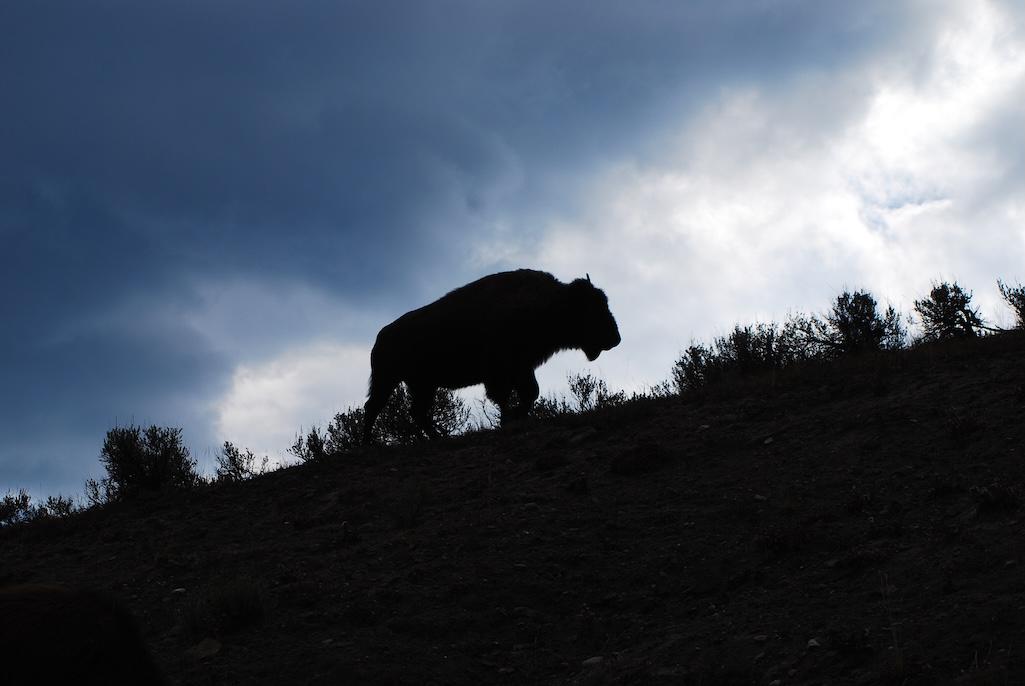
Yellowstone bison/Marcelle Shoop
It's been a tumultuous four years for the National Park System and the National Park Service, with powerful storms and wildfires sweeping the parks, insufficient funding and declining staff, particularly when you consider the addition of ten units since President Biden took office, and some questionable decisions.
Chuck Sams, who arrived as director of the Park Service with a lack of relevant experience when it came to running a federal conservation agency with some 20,000 employees, didn't succeed in his top priority — boosting the morale of the far-flung Park Service staff. While he talked about improving employee housing, success in a few big parks came from the work of friends groups and partnership grants or donations. There seemingly was no movement on helping the average park or on employee rents, and Congress certainly didn't help the cause.
Sams did break federal regulations pertaining to the taking of wildlife from within the National Park Service [36cfr2.1(a)(1)(i) and 36cfr2.1(d)] while circumventing the National Environmental Policy Act process to allow the Jemez Pueblo to "take" eagles within Valles Caldera National Preserve. How many eagles, and which types, were taken isn't known, as the Park Service permit granted the pueblo did not require a report on those details.
Sams also stood silent while his staff at Cumberland Island National Seashore off the Georgia coast ignored the plight of malnourished feral horses that are imperiling native threatened and endangered species.
His public silence in both those matters was especially concerning as both went against the National Park Service Organic Act he swore to uphold.
And Sams also was silent on the decision by staff at Big Cypress National Preserve not to propose any official wilderness despite identifying ~190,000 acres of eligible wilderness.
Was it a lack of institutional knowledge? Might decisions have been made differently if Sams hadn't disbanded the National Leadership Council, a band of Senior Executive Service NPS veterans who would gather with the director a few times a year to discuss what issues of merit were surfacing across the more than 85 million acres of the park system, or if his top deputy, Frank Lands, hadn't joined the Park Service in 2022 from the Army?
At the same time, Sams and Interior Secretary Deb Haaland, both enrolled tribal members, worked to more fully engage tribal nations in national park operations. How those new partnerships will work moving forward remains to be seen. Surely, there is traditional ecological knowledge and cultural affiliation that the tribes can bring into the parks. But what's concerning is that the full details of the 400 or so co-stewardship agreements Interior signed are not in public view.
If Interior and Park Service are so pleased with these agreements, why no transparency? If they're concerned about revealing sites within parks that are sacred to tribes, that information could easily be redacted.
But to not be able to present a complete list of the parks and tribes that have signed the agreements, nor their terms, without being required to by a Freedom of Information Act (FOIA) request is baffling. Public Employees For Environmental Responsibility filed such a request to obtain the agreement the Miccosukee and Seminole tribes signed with Everglades and Biscayne national parks and was told a reply should be coming ... by the summer of 2026. Is that managing the parks in the best interests of the American public that owns them?
Silence from National Park Service officials in Washington on myriad issues is not only disappointing, it is a disservice to the public that owns and holds the National Park System so highly. It's been a practice sadly repeated time and again under the Biden administration. Most recently the agency refused without explanation to allow their chief of wilderness stewardship to discuss wilderness in the park system. A hot button topic? Not when lined up against other topics the Park Service is facing.
Another topic dear to the park-visiting public is the ever-rising cost of a night in a national park lodge. As David and Kay Scott pointed out, national park lodge guest room price increases have outpaced: 1) increases in overall consumer prices and, 2) a St. Louis Federal Reserve index of room costs at hotels and motels. Yet at a time when the Park Service is concerned about a lack of diversity in the parks, no publicly voiced concern over these rising costs was raised by Sams or his deputies.
How trying the next four years for the Park Service will be certainly remains to be seen. But let's not forget that the first Trump administration never had a Senate-confirmed Park Service director, allowed bear-baiting and other controversial hunting practices on national preserves in Alaska, and weakened the Endangered Species Act. Already there are calls for reversals in Park Service policies and practices when it comes to wild lands and wildlife management, as well as for mining projects that could damage nearby park lands and waters.
I was asked the other day if I thought the Park Service had lost its way a bit, particularly when it came to natural resources and resource protection. I think a big part of the problem is the past few administrations have tightened their grip around the agency and see it through more of a political filter than resource conservation. I'm not sure what it will take to get back to where things were, but certainly having a strong, independent, and mission-driven director would be a great start.
Perhaps it's time to revisit calls for the Park Service to be pulled out of the Interior Department and made an independent agency like the Smithsonian Institution.

 Support Essential Coverage of Essential Places
Support Essential Coverage of Essential Places






